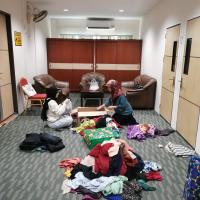
Clothes Donation Drive
In affiliation with the NGO, Society of Community Outreach and Training (SCOT) for my Internship DY UBD, I have planned a mini project, “Clothes Donation Drive”, as one of the approaches to assist and lessen the burden of the families in need in Brunei-Muara District. This project is in line with Messenger of Peace's initiatives to shape the Better World Framework, which aims to make the world a better place by inspiring young people all over the world to become responsible and committed citizens.
This project is linked to the United Nations Sustainable Development Goals, especially Goal 1: No Poverty. The SCOT's mission is to serve as a catalyst for long-term poverty alleviation in Brunei Darussalam. Brunei has relative poverty, according to SCOT, though His Majesty's government has been very generous in offering welfare assistance to all of its people. However, a few facts remain hidden from public view, such as people who do not have access to electricity, have insufficient food and clothing, and young children who must struggle to help their families..
For this project, we will be accepting clothes donations from SCOT members, their relatives and friends. Donated clothes will be inspected on whether it is acceptable for donation in terms of its condition. After collecting and inspecting the donations, the clothes will then be properly packed into their designated boxes for every family.
The objectives of this project is to aid the families in need in Brunei, to decrease fashion pollution and to raise awareness about poverty in Brunei.
We were able to collect roughly around 800 clothes in total. The clothes consist of t-shirts, blouses, baju kurungs, smart pants, sport pants, headscarves, etc,. For upper clothings we managed to collect around 274 clothes and 54 pairs of pants for both women and men, a total of 106 for kids or infant clothes and dresses, 410 headscarves (tudung), 4 inner scarves, 1 telekung, 2 tasbih and 3 bags. As this is a mini project, our targeted audience for collection of donated clothes were only from scot members, families, and close friends only and we targeted to donate these clothes to 5 underprivileged families in Brunei-Muara district.
For the packing process, we carried it out on the 27th January and we actually planned to do it in two shifts but during the actual day of packing, we managed to pack all clothes during the morning shift only. Prior to packing the clothes, we contacted the respective families to ask them how many members were in their household and how many were male and female so that we could divide the clothes respectively to the data we have gathered. Furthermore, we packed the clothes using recycle bags and used boxes and after we finished packing, we put the bags and boxes to the committees’ car.
On the 31st of January, we decided to meet up at One City Basement Parking at 9am as it is the nearest to the first house and has plenty of parking space. We went to the first house (1) in Mengkubau at 10.15am, second house (2) in Kota Batu 10:45am, third house (3) in Mentiri at 1:45pm, fourth and fifth house in Lambak Kanan at 2:15pm and 2:30pm respectively. We decided to not split into teams and go to different houses as we were only targeting 5 houses that are close to each other (does not take too long to arrive from each house). We were able to wrap up on time at 3.00pm which ends with a short debrief with our supervisors.
For a group of people, they might question why did we choose clothes? And why did we not decide on basic necessities that can actually help their everyday lives? However, clothes are also a form of luxury that not everyone can afford. We realised this even more when we arrived at one of the families to donate the clothes. The children were excited to receive the clothes and this made us understand that sometimes we fail to notice that having nice and presentable clothes is also a privilege.
Another inspiration for us to plan and execute this Clothes Donation Drive is in hope to contribute in reducing fashion pollution. According to an article by the World Economic Forum, ten percent of carbon emissions, water pollution and drying of water sources are caused by fashion
6
pollution (McFall-Johnsen, 2020). In the same article, it was found that people only kept half of the clothes they bought which generated 85 percent of textiles dumped annually. For this reason, we thought that instead of throwing our clothes, it would actually be better to give people who may need it. By doing so, we are able to avoid wasting clothes that are still in good condition and at the same time, helping others.
In conclusion, through this project, we aspire to help in improving the lives of the underprivileged people with the resources and power that we possess. It was a privilege to be able to do so and through this project, we also aroused a strong sense of responsibility in ourselves, as a person who is able to help the people in need in a sustainable way. Moreover, by executing this Clothes Donation Drive, we were also able to perform and strengthen our personal values and behave in a way that is true to our own ethical beliefs.




